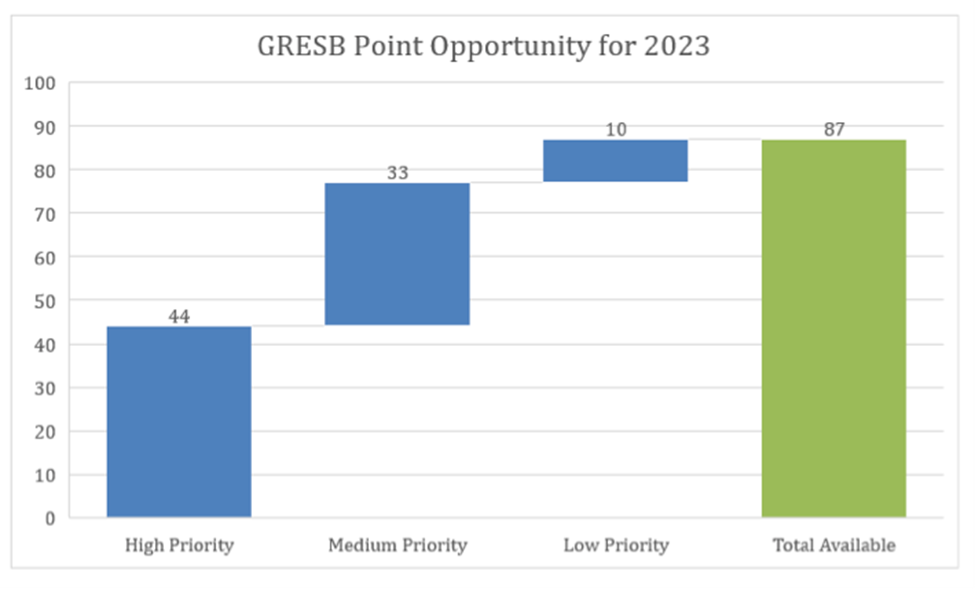Sustainability | September 1, 2023
National Storage Affiliates' sustainability journey: Utilizing energy management for improved operational performance and ratings
The much-anticipated annual GRESB scores will be released at the start of October. In this case study, we'll look at how Mantis helped National Storage Affiliates implement sustainability strategies and measures that improve the company's financial performance — while also boosting its GRESB score.
National Storage Affiliates (NSA) is a leading real estate investment trust (REIT) specializing in the ownership, operation, and acquisition of self-storage facilities across the United States.
As the company continues to grow and expand its portfolio, it recognizes the importance of environmental sustainability to ensure long-term success and demonstrate its commitment to investors and other stakeholders.
To this end, NSA embarked on a strategic initiative to improve its environmental sustainability performance as rated by the GRESB, a framework used to benchmark the sustainability of real estate portfolios.
The Objective:
To establish clear policies fueled by a software-enabled energy management and benchmarking system that would improve operations by supporting capital renewal planning, complying with local energy disclosure laws, and tracking performance over time.
“The GRESB framework is tailored to the range of sustainability issues facing institutional investors,” remarked Dan Winters, GRESB Senior Director. “Over 2,000 portfolios annually benchmark their sustainability programs, implementing best practices that drive enterprise business value.”
The Challenge: To Advance Sustainability Strategy With Energy Management
Over the past few years, NSA had already taken meaningful first steps toward improving its sustainability profile. For example, the company had previously implemented a range of projects to improve operational performance, including energy-efficient lighting installations, waste reduction initiatives, and occasional renewable energy adoption. And in 2022, NSA submitted for the first time to GRESB, focusing on management policy.
However, the absence of a cohesive sustainability strategy spanning both management and operational performance limited the company's ability to make significant sustainability performance improvement.
So, NSA turned to Mantis Innovation to help gain critical visibility into energy performance, and in turn, supercharge facility performance and earn improved GRESB ratings.
Solution 1: Set Sustainable Policies
Working collaboratively, Mantis and NSA conducted a gap analysis and charted a path forward to improve GRESB rating over time. Points for 2023 were categorized into high, medium, and low priorities.

To achieve the priority points in 2023 and beyond, NSA established policies that included the following actions:
- Monitor and decrease energy consumption, cost, and carbon emissions across its self-storage facilities
- Manage compliance with local energy disclosure and performance laws
- Prioritize capital renewal projects based on energy benchmarking data to maximize impact
- Enhance stakeholder communication regarding sustainability initiatives
“The consistent questions we hear from investors have to do with our environmental initiatives, GRESB submission, and how our ratings are going to improve over time,” said George Hoglund, Vice President of Investor Relations at NSA. “With the help of Mantis Innovation, we were able to establish a clear roadmap of how exactly to improve our GRESB score in the near and longer terms.”
Solution 2: Empower Actionable Insights With Energy Management
To achieve these objectives, NSA needed a new level of visibility into energy consumption across its portfolio. Project leaders deployed a robust software-enabled energy and ESG (environmental, social, and governance) data management system from Measurabl.
The centralized monitoring platform integrates utility usage and energy benchmarking data, connects with EPA’s ENERGY STAR® Portfolio Manager® benchmarking tool, and supports compliance with local energy disclosure and performance laws.
Using the system, NSA can now manage and monitor energy use, tracking patterns, identifying inefficiencies, and flagging areas with the most significant potential for improvement. And, working in partnership with Measurabl, the project team was able to submit the GRESB report efficiently and with confidence.
Solution 3: Harness Energy Benchmarking to Inform Capital Renewal
Energy benchmarking with Measurabl will play a pivotal role in identifying facilities with the highest energy consumption and carbon emissions. By comparing individual facilities' energy performance against industry standards and internal targets, NSA sees a benchmark rating for each property.
Armed with this data, NSA's management team can integrate potential return on investment (ROI) in terms of energy cost and energy performance rating into their capital renewal process. Decision-makers can then easily assess which facilities have the greatest room for energy performance improvement and target them for immediate upgrades.
This tech-forward approach equips NSA to drive meaningful change while utilizing financial resources in the shrewdest way possible.
The Next Steps: Upgrades and Ongoing Monitoring
With fresh insight from the energy management system and data-driven decision-making, NSA identified and is making various sustainable upgrades across its self-storage facilities. These include:
- Retrofitting lighting systems with energy-efficient LED fixtures
- Installing solar panels in suitable locations to generate renewable energy
- Upgrading HVAC systems for improved energy performance
- Encouraging sustainable practices among facility staff and tenants
Once the upgrades are live, NSA will monitor energy consumption and performance regularly to track success and pinpoint further opportunity for improvement.
The Outcome: Improved GRESB Rating, Sustainability Performance, and Savings
By prioritizing capital renewal projects based on energy benchmarking data, NSA is successfully aligning sustainability efforts with measurable outcomes, leading to improved GRESB ratings and stronger stakeholder relationships.
With data-driven insights NSA can dramatically reduce energy consumption and carbon emissions across facilities, strengthening brand reputation and stakeholder trust while fueling engagement with facility staff and tenants.
What’s more, optimizing facilities means the business can also save costs and improve bottom-line performance.
Ultimately, National Storage Affiliates' decision to deploy an energy management system and energy benchmarking exemplifies how companies can make a positive impact on the environment — while simultaneously tapping into powerful economic benefits.
Email Michael Bendewald at mbendewald@mantisinnovation.com or visit their website at mantisinnovation.com to learn more about powering facility performance, sustainability strategy, and GRESB ratings alike with data-driven insight.
Related Posts
Discover more content and insights from Mantis Innovation

Carbon Credits Explained: A Primer for Achieving Your ESG Goals
In the race to achieve net-zero emissions, carbon credits have become a crucial tool for companies with hard-to-abate emissions. As of 2024, almost half of the Fortune 500 companies have net zero

Five Trends Driving Data Center Facility Energy Optimization
Today’s digital economy, commercial and industrial digitalization, and the recent explosion in artificial intelligence and machine learning (AI/ML) powered computing are driving massive growth in

Modernizing Manufacturing Facilities: Practical Steps for Better Performance
In today's competitive manufacturing landscape, staying ahead requires more than maintaining the status quo. Modernizing facilities and operations is essential for improving efficiency, performance,

Modernizing Manufacturing Facilities: The Drivers and Direction
This blog is just a glimpse into the deep dive we take in our new white paper, Modernizing Manufacturing. Download the white paper here to skip the teaser and get the whole story. The stage is set